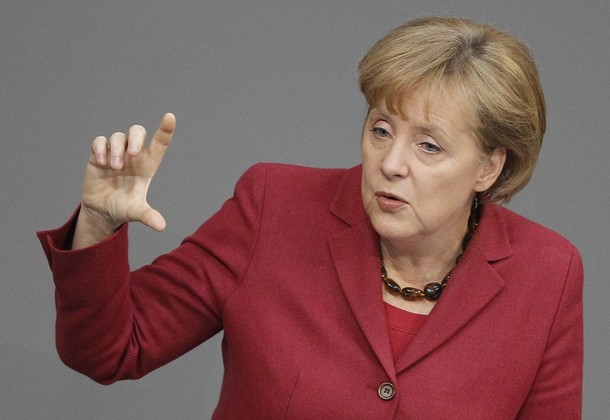
Germany continues to be the last holdout on a bailout for Greece. But the Merkel government is quietly setting up a scenario under which a deal could be struck.
A Spiegel feature by Markus Feldenkirchen, Christian Reiermann, Michael Sauga and Hans-Jürgen Schlamp makes clear that there is serious conflict over this issue at the very highest level of the German coalition, with Chancellor Merkel and finance minister Wolfgang Schäuble in sharp disagreement.
The finance minister sees the euro as proof of Europe’s integration ability, and he is willing to use German government aid to rescue Greece, if necessary. This is precisely what Merkel wants to avoid at all costs, which is why she favors intervention by the International Monetary Fund (IMF).
The conflict is about more than how best to handle a European country that is deeply in debt. It is also a question of power, as Schäuble and Merkel clash over the German leadership role in European politics.
Officially, the chancellor insists that she is "completely in agreement" with her finance minister. But close associates of both politicians say this is not the case. Senior officials in the Berlin government and at the European Commission in Brussels report deep alienation, contradictory directives and "trickery" on both sides.
The behind-the-scenes dispute recently reached its first bizarre climax. To prevent Merkel and her staff from discovering what he was thinking about before he was ready to announce it, Schäuble ordered his staff not to speak to anyone at the Chancellery. From now on, all contacts and information are to be channeled through top ministry officials. Telephone conversations and the exchange of documents now require prior approval by department heads. A ban on communication with government headquarters — even veteran Finance Ministry officials cannot recall anything like it. Officials at the ministry say that it is "a measure to safeguard departmental authority."
While Merkel is pushing for a solution involving the IMF, Schäuble has "categorically rejected" the idea, "saying that he felt it would be shameful if the Europeans couldn’t solve their own problems within the monetary union."
The minister is worried about political union in the EU. When the IMF provides bailout funds, its representatives typically become deeply involved in the affairs of the troubled countries in question, dictating how they should structure their financial and monetary policy. Schäuble fears that such requirements, directed at a member of a monetary union, would have an affect on other euro zone countries. But his biggest concern is that the independence of the European Central Bank (ECB) could be compromised.
Besides, the US-dominated IMF is regarded as an extension of US foreign policy, which, says Schäuble, has no place in the euro zone. For these reasons, he is willing to incur even more debt than the €80.2 billion ($110 billion) already budgeted for this year — and to transfer more money to Greece.
An FT report by Quentin Peel, Ben Hall, and Joshua Chaffin shows some substantial movement towards the inevitable bailout. And it would seem Merkel’s preferences are dominating:
Germany has set out three fundamental conditions for any rescue package for Greece, including involvement of the International Monetary Fund and a commitment by its European Union partners to tough new rules to control public debt and deficits in the eurozone – including necessary EU treaty changes.
[…]
The senior official in Berlin said that if there were to be a deal on a “mechanism” for assistance, it could be triggered only once Greece had exhausted its capacity to raise money on the international capital markets. Germany is insisting that the IMF make a “substantial contribution” to any rescue package and that the 27 EU members agree to negotiate strict new rules to prevent any recurrence of such a debt crisis, with treaty changes if needed.
Berlin’s position emerged in response to growing pressure from the Commission and other EU member states to reach a deal at this week’s summit.
In Brussels the move was seen as a helpful opening, while Nicolas Sarkozy, France’s president, seemed to have relaxed his opposition to IMF involvement. He called for the eurogroup summit after a meeting with José Luis Zapatero, Spain’s prime minister.
The Economist‘s Charlemagne is almost certainly reading between the lines correctly:
NOBODY will be allowed to drown. That was the message from a senior politician yesterday, in a small private gathering dominated by talk of bailouts for Greece. That said, it seems clear that Greece is not going to be thrown a lifebelt by its partners in the euro zone until it has sunk beneath the waves at least twice, and looks as if it can struggle no more. Only when a drowning is imminent will Germany, the biggest holdout, agree to a mechanism to support the spendthrift, statistic-fiddling Greeks.
Peel and company report that "Both France and the UK are opposed to any such suggestion of reopening treaty negotiations." But, given that Germany is driving this train, it’s not clear what choice they have.
James Joyner is managing editor of the Atlantic Council. Photo credit: Reuters Pictures.
Image: angela-merkel-eurozone-reform.jpg
